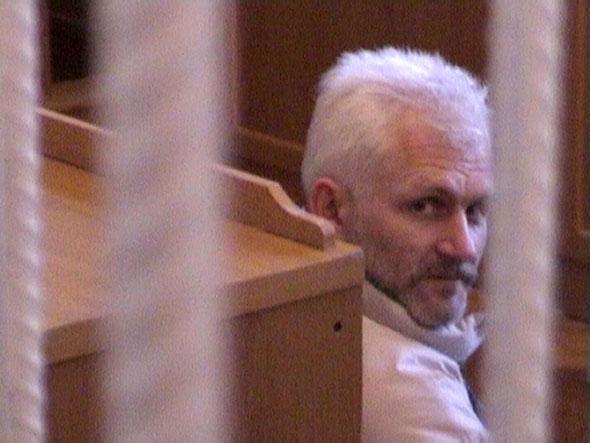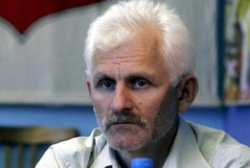 Article 19, Index on Censorship and English PEN consider the charges brought against Ales Bialiatski politically motivated and initiated to paralyse the activities of the already decimated human rights community in Belarus. Key witnesses for the prosecution reportedly did not understand or verify the authenticity of case documents.
Article 19, Index on Censorship and English PEN consider the charges brought against Ales Bialiatski politically motivated and initiated to paralyse the activities of the already decimated human rights community in Belarus. Key witnesses for the prosecution reportedly did not understand or verify the authenticity of case documents.
Ales Bialiatski is the deputy chair of the International Federation for Human Rights (FIDH) and the president of one of Belarus’ best known human rights organisations, Viasna (Spring). He is also a member of Belarusian PEN.
In October 2003, the Belarusian government closed down Spring’96, the predecessor of Viasna, on the basis of highly controversial legislation which tightly controls the registration and activities of NGOs.
Since then, the authorities have continuously turned down the numerous demands for the official registration of Viasna. As a result the organisation has been unable to open a bank account in Belarus. To access funds and sustain the human rights activities of Viasna, Ales Bialiatski has had thus no alternative but to open personal accounts in Lithuania and Poland.
Beliatski’s case
Ales Bialiatski, the head of the Viasna human rights center, was arrested on August 4. The trial against him for large scale concealment of income started on 2 November in Minsk.
The charge stems from Byalyatski’s reported use of personal bank accounts in Lithuania and Poland to receive funding from international donors in support of human rights activities in Belarus.
A number of international human rights activists have been denied entry visas to Belarus, preventing them from monitoring the trial proceedings and their fairness.
Financial documents were reportedly not translated or verified as genuine, and witnesses for the prosecution did not understand their content. The Lithuanian Ministry of Justice, in a statement to Lithuanian news agencies indicated that it had recalled the information it had previously submitted and that this should not be used as evidence in the court case.
Individuals wanting to attend the court hearings have had their clothes checked and those wearing t-shirts with Ales Bialiatski’s picture were denied entry or forced to take the t-shirts off before gaining access.
Additional charge
At the trial on 10 November, prosecutor Valery Saykouski asked the judge to adjourn the trial until 16 November. He said "the new charge will significantly differ from the previous one," but did not elaborate.
Valiantsin Stefanovich and Uladzimer Labkovich, representing Vyasna, told RFE/RL the new charge will probably be "conducting activities on behalf o f an unregistered organization." They said Ales Bialiatski does not deny that Viasna continues to operate despite having been officially shut down by the authorities.
f an unregistered organization." They said Ales Bialiatski does not deny that Viasna continues to operate despite having been officially shut down by the authorities.
Belarusian human rights activist Hary Pahanyayla told RFE/RL the prosecutor probably asked for the trial to be adjourned because the charge of tax evasion against Bialiatski could not be proven in court.
Ales Bialiatski pleaded not guilty to the charge of tax evasion. His colleagues and supporters say the case against him is politically motivated. Bialiatski had been circulating reports about authorities’ crackdown on peaceful protests since the disputed presidential election in December.
Trial – part of a broader campaign to persecute regime’s critics
Following years of repression and continuous clampdowns, Viasna is one of the only remaining organisations in Belarus openly speaking out about human rights violations within the country.
The trial is part of a broader campaign of the Belarusian authorities to persecute its critics, paralyse the organisations they work for and prevent them from performing their legitimate role as watchdogs – holding the government to account for its actions.
Simultaneously state media and online resources such as predateli.com (a site about ‘traitors of Belarus’) publish ongoing defamatory information  about Ales Bialiatski and other civil society activists and politicians.
about Ales Bialiatski and other civil society activists and politicians.
In an apparent move to further intimidate civil society activists in Belarus, recent legislative amendments ban Belarusian NGOs from keeping funds in banks and other financial institutions on the territory of foreign states.
The amended Criminal Code of Belarus establishes criminal liability for receiving any foreign grants or donations ‘in violation of the Belarusian legislation’.
As part of the current trial proceedings the prosecution has called several Belarusian human rights defenders to the witness stand, particularly those that have allegedly received funding through Ales Bialiatski’s foreign accounts. It seems only a matter of time before the next human rights defender will be arrested on criminal charges.
Belarus obliged to uphold the rights to freedom of association
Civil society’s activities are enshrined in international law, and covered by the rights to freedom of association and expression, which are interdependent rights, essential to the realisation of other human rights, genuine democracy and the rule of law.
As a state party to the International Covenant on Civil and Political Rights, Belarus has a legal obligation to uphold the rights to freedom of association and expression.
As a member state of the Organisation for Security and Cooperation in Europe (OSCE) it is bound to their human dimension commitments to ‘ensure that individuals are permitted to exercise the right to association, including the right to form, join and participate effectively in non-governmental organizations which seek the promotion and protection of human rights and fundamental freedoms, including trade unions and human rights monitoring groups’.
Article 19, Index on Censorship and English PEN call on the Belarusian authorities to:
-
Immediately drop the charges against Ales Bialiatski and release him unconditionally;
-
Extend an invitation to the UN Special Rapporteur on the rights to freedom of peaceful assembly and of association;
-
Implement the recommendations of the OSCE special rapporteur on Belarus as part of the Moscow Mechanism and ‘to accept a full and permanent monitoring of human rights’.
Related articles:
The trial of Ales Bialiatski continues in Belarus
Belarus closes borders before the trial (updated)
Human Right House Foundation against the persecution of Bialiatski





